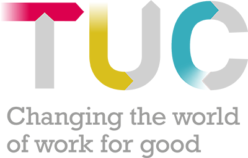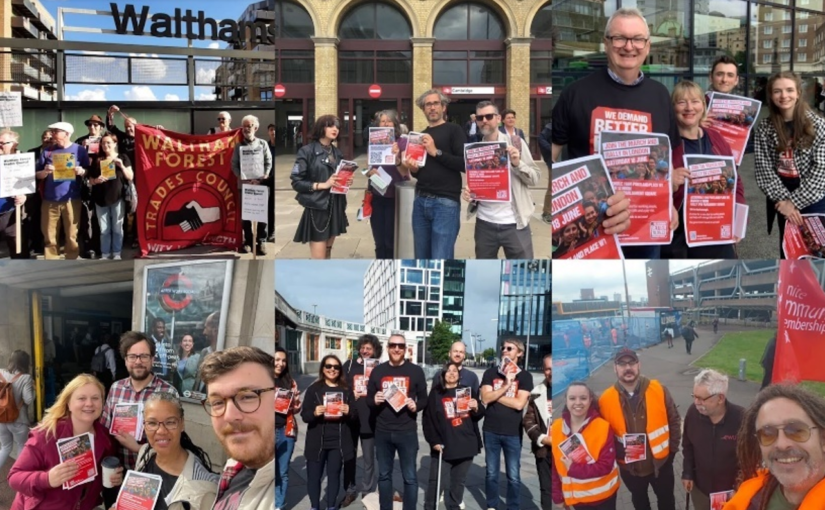In the run up to the We Demand Better rally on 18 June, the TUC tested new ways to spread the word amongst union activists and potential marchers. As well as a series of local “road show” events, we sought to use the Megaphone campaign platform to support activists in hosting their own leafletting sessions at train stations across the country.
The TUC have tried this before, in support of BFAWU’s second McStrike in 2019. That time, 38 town-centre leafletting events took place, with 136 activists registering to help out. The learning from that first try meant we were able to scale the activity considerably.
What happened
Trade unionists from across the country organised 130 local leafleting events distributing 140,000 leaflets. The scale of this action significantly exceeded the initial goal of organising 50 events. Most events took place on a day of action on Wednesday 8 June. An additional day of action was organised on Wednesday 15 June due to a high level of activist demand.
Trades Councils formed the bedrock of the action, with approximately 30% of the events registered being organised through local Trades Councils. This was complemented by a distributed organising approach which enabled the action to scale significantly, with 70% of events being organised directly by supporters on the Megaphone platform.
Despite the rally being held in London, the local leafleting events were organised across the UK. Not only did this enable trade unionists to speak to the public about the #DemandBetter march, but also to have organising conversations with working people about joining a union.
What we did
The organiser journey was designed to make it as easy and streamlined as possible, to minimise any barriers to participation.
All organisers went through the same journey, regardless of whether they were registering on behalf of their Trades Council or not, to minimise duplication and ensure the smooth flow of information.
- Initial ask: Emails were sent to local Trades Councils and Megaphone supporters asking people if they’d be willing to host an event in their area. For Megaphone, this initial send was limited to people who had already taken “higher bar” actions, that demonstrated a greater degree of engagement than just signing a petition. The emails linked to a “hand raiser” sign-up form to capture people’s contact data.
- Registering events on a map: Everyone who completed the “hand raiser” received an email with more information and a link to the Megaphone event map where they could register their event and give their postal address to receive flyers. This is a part of Megaphone’s extended functionality, which can register grassroots-organised events onto a map, for others to sign up to attend.
- Peer-to-peer text conversation: There had to be a responsive support channel for activists, as they were being asked to take on a key responsibility in the campaign. Everyone who completed the “hand raiser” also received a text message which they could reply to, engaging them in a conversation about hosting the event, answering any questions and ensuring they had registered their event on the map. Using the ThruText P2P platform let us respond quickly to event organisers’ texts.
- Receive leaflets: Everyone who registered their event on the map (an organiser), was posted a pack of leaflets in the days leading up to the day of action.
- Receive organiser briefing note: All organisers received a briefing note about the day of action with advice on running an effective event.
- Join organiser WhatsApp Group: All organisers were also invited to join a WhatsApp Group to share photos and anecdotes, build a sense of community and troubleshoot issues in a timely fashion.
Once the events were registered, a link to the map was emailed more widely to Megaphone’s less-engaged supporters, asking them to find their nearest event on the map and sign up to it.
An automatic journey built into the Megaphone tool then contacted those who had registered, giving them a message from the event organiser. Organisers were able to see how many had registered for their event, and send email updates to them via the system, to co-ordinate how people would meet up on the day.
Having the results from this action built into the TUC’s campaign CRM will be really useful in organising future events series. Knowing someone was willing to attend an event makes it more likely that they would be a good prospect to organise one themselves.
What we learned
Three key ingredients enabled this action to reach the scale it did:
- Having access to the Megaphone list was critical. One of the aims of the Megaphone platform is to build an email list of people who support workers issues. The TUC engages them regularly in online activity and build this into other forms of support for TUC campaigns and those of affiliates using the platform. Having this resource in advance is vital to running anything at scale, but it takes years of work to build up supporter engagement to this point. Building engagement on your own member lists through online campaigns will be similarly important in getting members to step up from basic actions like petitions, to taking real world actions with a bigger commitment.
- Taking a distributed organising approach enabled the action to scale. Individual trade unionist activists could organise events to complement those organised by local Trades Councils. Social proof is helpful here. By showing that events were already being organised, it helped other activists have confidence that they could successfully do it too. By showing that other attendees were joining also gave supporters the confidence to join an event with an organiser they might not know yet.
- Having all events hosted on a central map meant that activists could self-organise and avoid duplication. It also helped supporters to identify with the campaign by seeing things happening in a way they can instantly recognise.
This post was written by Emma Rees, of consultancy The Social Practice, who supported us on this campaign.
If you’d be interested in how you might use distributed events in your own campaigns – via the Megaphone platform or other routes – please do get in touch.

